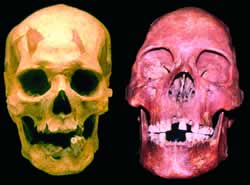September 08, 2004
Headlines from heads
 At the
British Association for the Advancement of Science's Festival of Science 2004, geoarcheologist Silvia Gonzalez presented evidence that the Pericues, an extinct Baja California tribe, are
genetically "closer to the ancient populations of southern Asia, Australia, and the South Pacific Rim" than to the northern Asian populations that other Native Americans have been thought to have come from. Gonzalez also suggested that the two oldest known Americans (Kennewick Man and Peñon Woman) might have been from a similar background.
At the
British Association for the Advancement of Science's Festival of Science 2004, geoarcheologist Silvia Gonzalez presented evidence that the Pericues, an extinct Baja California tribe, are
genetically "closer to the ancient populations of southern Asia, Australia, and the South Pacific Rim" than to the northern Asian populations that other Native Americans have been thought to have come from. Gonzalez also suggested that the two oldest known Americans (Kennewick Man and Peñon Woman) might have been from a similar background.
Here's a press release from the Natural Environment Research Council, which sponsored the research, and a Discovery Channel report, which quotes Gonzalez as follows:
"... it is difficult to trace their point of origin as people 10,000 or 20,000 years ago did not look like their modern counterparts in many parts of the world, including Africa, Europe, and China.
"It is likely that southeast Asia 20,000 years ago was inhabited by people who more closely resembled present-day Polynesians or Australian aborigines so this could indeed be a source for the first Americans. They could have taken a coastal route to get there around the North Pacific Rim — it seems unlikely that they came directly across the Pacific."
Reuters pitches this as a political "hornets' nest", asserting that "[t]he claim will be extremely unwelcome to today's native Americans who came overland from Siberia and say they were there first". This seems like a pretty sweeping statement, predicting the reactions of a large and diverse group, some of whom might also turn out to be descended from groups like those that Gonzalez is studying. By what right does Reuters speak for all these people?
Even the Discovery article, which (as Claire Bowern says) is quite good, expresses Gonzalez' findings in a linguistically odd way:
DNA analysis of skulls found in Baja California that belonged to an extinct tribe called the Pericues reveal that the Pericues likely were not related to Native Americans and that they probably predated Native Americans in settling the Americas, according to an announcement Monday.
In order to make sense of this, you have to agree that the Pericues, though they are native Americans, and perhaps even descendents of the first hominids to settle in North America, are not in fact Native Americans. But everyone used to think that they were Native Americans, before these results came along. So what if it turns out that lots of other native Americans are not Native Americans either?
With respect to the larger NERC program this is a part of, Reuters quotes Clive Gamble as saying "We want to make headlines from heads. DNA will give us a completely new map of the world and how we peopled it." I think there's more to say about this. Among other things, there's question of whether "we" should be described in terms of our DNA or our culture -- or both. There's also a pretty scandalous history of over-interpretation of phylogenies based on DNA and other biological markers (as well as some excellent work of the same general kind). And (as Reuters reminds us) there are important political resonances to these origin stories. So all in all, I for one am not very enthusiastic about the idea of "science by headline" in this area.
I'd like to hear about how Gonzales' results connect to Johanna Nichols' ideas about peri-Pacific linguistic typology, from someone who knows more than I do about such things -- like Bill Poser?
[via Claire at Anggarrgoon ]
Posted by Mark Liberman at September 8, 2004 12:52 PM